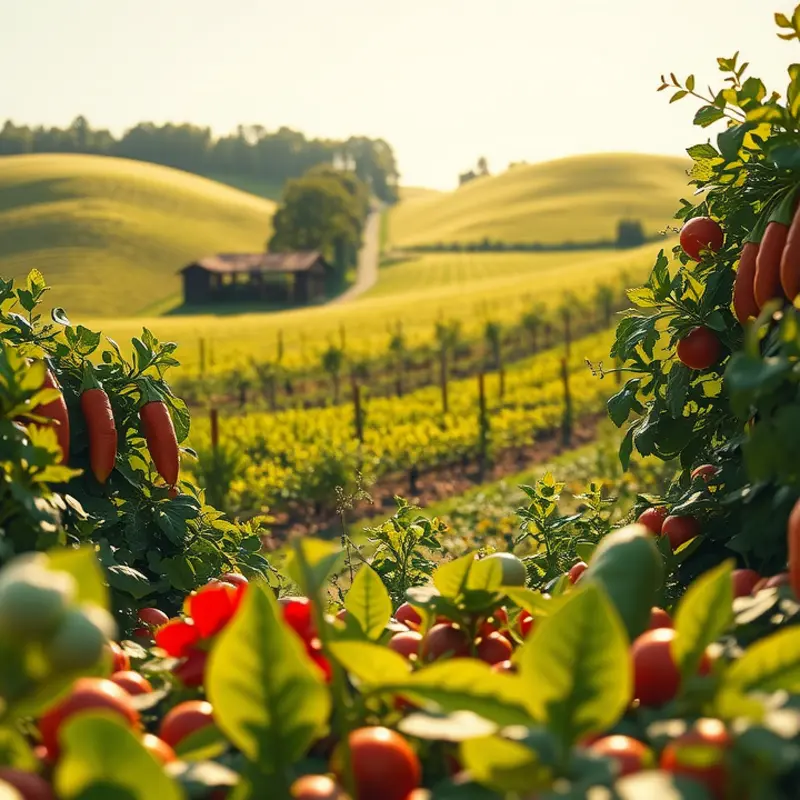Understanding the differences between organic and conventional produce is essential for making informed dietary decisions. Both types have their advocates and distinct characteristics. While some people swear by organic for its perceived health benefits, others may choose conventional for cost-effectiveness. This guide clarifies common myths and provides useful insights into selecting the best produce for your needs.
Understanding Organic Produce: Myths and Realities

The term organic often evokes images of lush fields, free from chemicals and artificial influences, but what does it truly mean? Certified organic produce must adhere to specific regulations, exempting synthetic fertilizers, pesticides, and genetically modified organisms (GMOs). However, navigating the world of organic produce requires debunking several myths to make well-informed decisions.
A common misconception is that organic means pesticide-free. In reality, organic farming does allow certain natural pesticides, although they are considered to be less harmful. These substances undergo rigorous evaluation to ensure they meet organic standards.
The perceived health benefits of organic produce often ignite debates. Studies comparing organic and conventional produce show mixed results regarding nutritional differences. While some research suggests higher antioxidant levels in organic fruits and vegetables, other studies find minimal nutritional discrepancies. The potential health benefits of organic production lie more in reduced exposure to pesticide residues and additives rather than in nutritional content.
Organic farming practices extend beyond individual health concerns to environmental impacts. Organic farming typically prioritizes soil health through crop rotation and composting, potentially improving biodiversity. Reduced chemical run-off helps protect waterways, contributing to overall ecosystem stability. Yet, the sustainability of organic farming can vary, with challenges like lower yields and higher land use compared to conventional methods.
Price is another factor often discussed in the organic versus conventional debate. Organic produce can be more expensive due to labor-intensive farming practices and certification costs. Understanding these dynamics can help consumers make more informed purchasing choices, balancing their health, environmental values, and budget constraints.
For those seeking to incorporate more organic produce while considering budget and accessibility, adopting a flexible approach can be beneficial. Prioritize organic options for produce known to have the highest pesticide residues conventionally, such as berries and apples, if that aligns with your values.
Lastly, like any food choices, understanding food labels and myths is crucial. Mindful eating and intentional purchasing can empower consumers to align their consumption patterns with their health and environmental goals. Armed with knowledge about organic produce, individual consumers can make choices that reflect their own priorities in the broader food landscape.
Conventional Produce: Nutritional Value and Safety

Conventional farming practices are often scrutinized for their use of synthetic fertilizers and pesticides; however, they still play a critical role in providing essential nutrients. The nutritional value of conventional produce parallels that of its organic counterparts. Vitamins, minerals, and fiber remain consistent across both farming methods.
The safety of conventional produce is governed by strict regulations. Government bodies set maximum residue limits (MRLs) for pesticides, ensuring that produce meets safety standards before reaching consumers. Regular testing and monitoring occur to minimize risks. According to experts, the level of pesticide residue found in conventional produce does not pose a significant health hazard when the produce is properly washed.
Pesticides are indispensable in conventional farming for managing pests and maximizing yield. Farmers strive to implement integrated pest management (IPM) practices to reduce pesticide reliance and environmental impact. Despite these efforts, concerns about biodiversity and soil health persist. Some argue that conventional practices can lead to soil depletion. However, advancements in sustainable practices aim to mitigate these concerns.
Environmental impacts from conventional agriculture are considerable. Synthetic fertilizers can lead to waterway pollution if not managed correctly. Innovations in precision agriculture and responsible application techniques are helping to reduce these environmental concerns. These methods ensure that nutrients are efficiently used, higher yields are maintained, and off-site impacts are minimized.
One important consideration is the consumption of a varied diet to minimize exposure to a specific pesticide. This balance can help those making conscious nutritional choices. For ways to boost flavor in your meals without resorting to excessive salt, consider exploring this guide on flavor boosters without salt.
Ultimately, the choice between organic and conventional produce depends on individual priorities. Whether your focus is on potential environmental impacts, safety, or cost, each option offers valuable nutritional benefits. The ongoing advancements in farming practices continue to support the safety and quality of conventional produce, ensuring it remains a vital component of global food systems.
Final words
Both organic and conventional produce have unique characteristics and advantages. Understanding these differences empowers you to choose the best option for your health, budget, and values. Organic produce may appeal to those prioritizing natural farming methods and potential health benefits, while conventional produce often provides a cost-effective alternative without sacrificing nutritional value. Ultimately, focusing on variety and balanced eating habits remains crucial, regardless of the type of produce you select.








